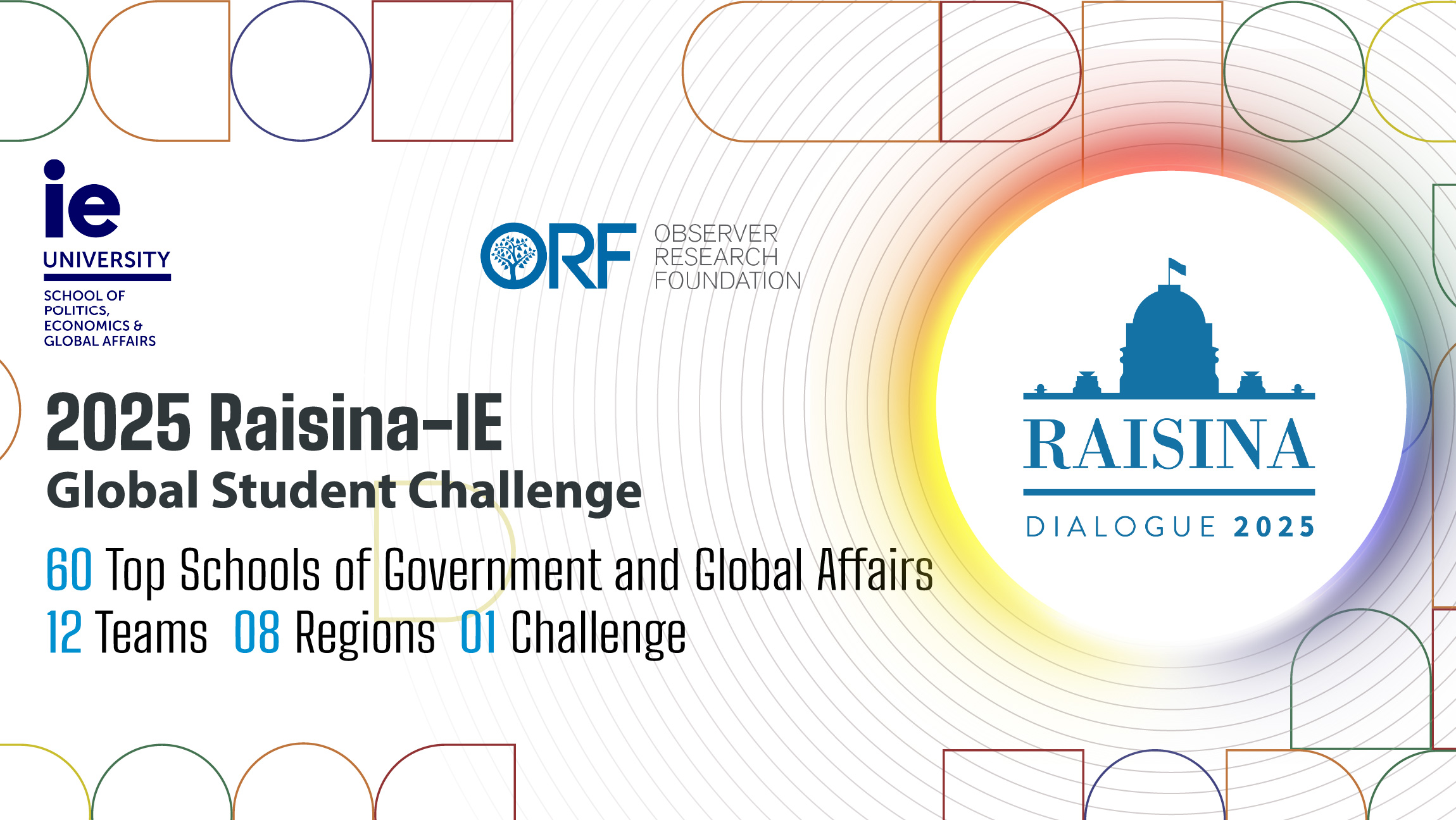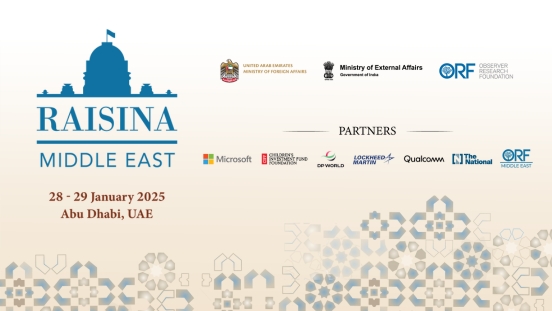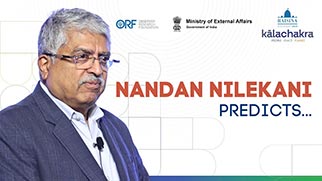
The Raisina Dialogue is India’s premier conference on geopolitics and geoeconomics committed to addressing the most challenging issues facing the global community. Every year, leaders in politics, business, media, and civil society converge in New Delhi to discuss the state of the world and explore opportunities for cooperation on a wide range of contemporary matters. The Dialogue is structured as a multi-stakeholder, cross-sectoral discussion, involving heads of state, cabinet ministers and local government officials, who are joined by thought leaders from the private sector, media and academia.
The conference is hosted by the Observer Research Foundation in partnership with the Ministry of External Affairs, Government of India. This effort is supported by a number of institutions, organisations and individuals, who are committed to the mission of the conference.


We will investigate the unprecedented shifts underway in the global landscape of power and influence. The emergence of new actors is reconfiguring old relationships and creating new ones. Our discussions will interrogate the powers and processes that are central to the evolving global geopolitics of our time. They will reveal how global actors have navigated complex crises in the recent past—while also reasserting their interests and agency. An approach grounded on the imperative to minimise and mitigate the impact of such challenges must be discovered. These shifts and disruptions to the geopolitical order have rendered the global systems and institutions that were meant to govern the global commons obsolete. Amidst the rising tide of imminent critical challenges that implicate all of humanity, how can a new consensus be forged? What alignments and alliances will emerge, and which will stay firm in a geopolitical landscape marked by shifting sands?
Climate change is not just a technical challenge but a geopolitical one: it is global in scope but constrained by politics. It is further exacerbated and complicated by the challenges of constrained finance. Addressing this challenge would require pivotal questions to be answered: who must act, where the action is required, and how it can be effectively implemented. Crucially, the regions essential to staying below a two-degree warming threshold lack the resources to undertake substantial actions. This vertical will examine how nations are reconciling economic growth with climate action, addressing the dual imperatives of energy access and carbon mitigation. We will highlight the innovative mechanisms being developed to ensure that finance and technology are directed to the areas of greatest need. Given that the effects of climate change are already changing lives and livelihoods, the yawning gap in adaptation finance and technology has begun to bite. Nations with abundant resources must identify ways to invest in regions and communities essential for mitigation efforts and comprehensively address the challenges of adaptation as well as loss and damage.
Technological progress continues to redefine the boundaries of possibility, driving profound changes in how we live, work, and engage. But advances today may be different from those in the past: rather than increasing human autonomy, they might reduce it. More complex technological solutions, deeply embedded in governance, the economy, and our daily lives, are assuming an agency of their own. We will explore the latest technological advancements and their potential to address global challenges while also considering the ethical and societal implications of rapid technological adoption and whether malicious new agents require new forms of co-operation on cybersecurity. Raisina will highlight the many ways in which tech is enabling inclusive growth – for example, digital public infrastructure has a transformative impact on innovation, public service delivery, and digital financial inclusion. The digital economy’s expansion is being driven in part by the exponential growth of fintech, and how we choose to regulate fintech will increasingly determine the movement of finance between people, institutions, and nations. The geopolitics of tech, too, has become ever more complex: Amid great power contestation, governments and companies are considering realignments of their tech supply chains and redirections of their flows of data and services. Finally, AI has begun to change many of our societal assumptions about technology. We will illuminate how its multi-layered character—tool, medium, actor, person—will permanently change debates around the agent and agency.
Trade is the new battlefield. The global economy, once hurtling towards ever greater interconnectedness, has sharply reversed course. Derisking, decoupling, and protectionism have increasingly fuzzy boundaries, and security is now about economics as much as it is about weaponry. Raisina will analyse the causes and consequences of these economic conflicts and explore the pathways to resilient and fair trade practices in a time of increasing protectionism and economic nationalism. We will seek to identify how new and inclusive paradigms can be evolved—a new system for trade and investment that preserves the lessons and benefits of the decades of globalisation while opening up opportunities for the young, aspirational nations that will drive growth and innovation in this century.
Traditional development discourse has died a death unmourned. Today, the countries of the Global South are no longer objects of discourse but the architects of their own futures. Bold new paradigms are blossoming as these nations carve out unique paths to prosperity and pioneer innovative governance. The inspiring success stories of emerging economies — expanding access to quality healthcare, championing environmental security, fostering regional cooperation, strengthening institutions, and harnessing digital technologies for inclusive growth—offer invaluable lessons and replicable models for other nations. As this Global South-led development revolution unfolds, new frontiers for inclusive and sustainable development need to be explored, driven by democratic aspirations, gender empowerment, and grassroots decision-making; fresh partnerships need to be forged; historic ties need to be revitalised—all in pursuit of a Global South- driven post-2030 Agenda. The overarching goal of this vertical is to deliberate deeply into the Global South-led new development paradigm to make it resilient and agile.
Finally, the conference will address conventional and emerging threats to global security. Wars will be won in the second decade of the 21st century both through old-fashioned industrial capability, capable of producing an overwhelming mass of tanks and artillery shells in short order—and also through swift innovation in unmanned aerial vehicles and battlefield information systems. Will emerging capabilities allow for asymmetric warfare? Or will conflict be resolved through the ability of more potent states to move masses of men and material? We will question the role of non-state actors, from pseudo-states to private militias, and problematise the “new normal” of persistent cyber-attacks that weaken state sovereignty. Through exploring the evolving nature of conflict, we will identify the strategies states are choosing to ensure global security and stability. Above all, we will discuss how, without leadership, no world order can survive: the 21st century is calling for a guarantor of peace, perhaps a collective one, but nobody appears to have stepped up yet to perform this thankless yet critical task.






Prime Minister of India

Prime Minister of New Zealand

Founder and Chief Executive Officer, Re:Set , United Arab Emirates

Minister of Foreign Affairs, , Maldives

Ambassador of the United Arab Emirates to India,

Joint Secretary, Multilateral Economic Relations; Sous-Sherpa for G20, BRICS, IBSA, Ministry of External Affairs, , India

Additional Secretary, Ministry of Electronics and Information Technology , India

Executive Director and Director of Research, The Egyptian Centre for Economic Studies , Egypt

Director, Asia Program, The Asia Group , United States of America

Director, Konrad-Adenauer-Stiftung , India

Executive Director, Centre for Dialogue, Research and Cooperation , Ethiopia

Deputy Chief Executive, Asia New Zealand Foundation , New Zealand

Affiliate Lecturer, King's College London , United Kingdom

Lecturer, Curtin University , Australia

Managing Director, Asia Pacific, Topsoe India Pvt. Ltd. , India

Former Member, Deputy to the European Parliament , Portugal

Managing Director, Ghost Partners , New Zealand

Board of Trustees, Hutchings Barsamian, Mandelcorn, LLP , United States of America

Lead, Business Co-Development, Leadership Group for Industry Transition , Sweden

Senior Policy Advisor,, Munich Security Conference , Germany

Director EU Policy, Confederation of Swedish Enterprise , Sweden

Head of Programmes, Konrad Adenauer Stiftung , India





































Foreign Secretary

Chairman
Observer Research Foundation

Joint Secretary, Policy Planning & Research
Ministry of External Affairs

Vice President, Studies and Foreign Policy
Observer Research Foundation








